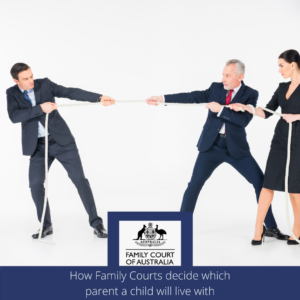Decision making for long term and day-to-day welfare of children between separated parents can often be difficult. From separation, there is a presumption that each parent has equal shared parental responsibility meaning they each have the right to be consulted, and to have a say, in many of the major aspects of each child’s upbringing (such as what school they will attend).
It is often wrongly assumed that when parents separate that the children’s mother will automatically be the parent that has the right to have the children live with her, however, no such stipulation exists in Australian family law. Both parents are seen jointly responsible for their children, and that includes determining where they live.
Assessments will be needed of each parent’s ability to provide for the children and that applies to more than just their earnings and financial position. It will relate to how they can provide for all their children’s needs and to what degree the children living with them rather than the other parent would be in the children’s best interests.
For those children who are deemed mature enough to do so, the court may ask them to give their own personal view as to which parent they want to live with. That is not to say that a judge will decide solely on that child’s opinion, especially if all the other evidence points to that not being in their best interests.
Regardless of the decision the Family Court makes, it should be noted, that, unless there is a reason not to, it will want to ensure that the parent that the children do not live with has as much contact with them as possible.
Should any of the above resonate with you or someone you know, please contact Accelerate Family Law on 1300 130 810 to book an initial consultation.

